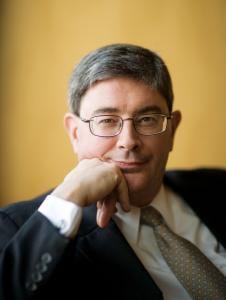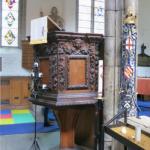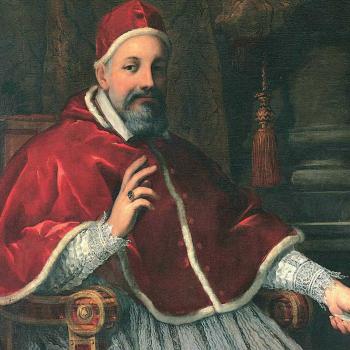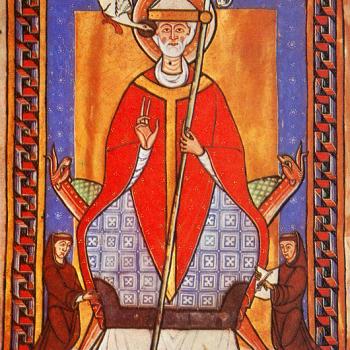George Weigel, distinguished senior fellow of Washington’s Ethics and Public Policy Center, one of the world’s premier analysts of the Catholic Church, and a prolific author. His new book is The Irony of Modern Catholic History: How the Church Rediscovered Itself and Challenged the Modern World to Reform.
JT: What is the “irony” of modern Catholic history?
 GW: There are many ironies in this particular fire. The first mega-irony is that the Catholic encounter with modernity, which began with raw anathemas being hurled in both directions, eventually led the Church to rediscover the essential truth about itself as an evangelical, missionary enterprise. The second mega-irony is that, in the course of that rediscovery, the Church developed a social doctrine—a way of thinking about and configuring modern social, cultural, political and economic life—that just might help save an increasingly incoherent post-modern world from itself.
GW: There are many ironies in this particular fire. The first mega-irony is that the Catholic encounter with modernity, which began with raw anathemas being hurled in both directions, eventually led the Church to rediscover the essential truth about itself as an evangelical, missionary enterprise. The second mega-irony is that, in the course of that rediscovery, the Church developed a social doctrine—a way of thinking about and configuring modern social, cultural, political and economic life—that just might help save an increasingly incoherent post-modern world from itself.
JT: When I read news about the Catholic Church, it’s rarely good: sex abuse, factionalism, and large percentages of American and European Catholics who have abandoned some of the Church’s core teachings. The Irony of Modern Catholic History, by contrast, is at least cautiously optimistic. “For in the twenty-first century,” you write, “the Catholic Church is more vital and consequential than it was when Pius IX sought refuge on Old Ironsides.” How so?
GW: Why expect to read any good news about the Catholic Church when you read little or no good news about anything else? Good news is not news these days. I’m not optimistic but I’m hopeful. By summoning people to a revolution of conscience, John Paul II became the pivotal figure in the collapse of European communism, thus demonstrating the Catholic capacity to bend the course of history in a more humane direction. Catholicism is growing by leaps and bounds in sub-Saharan Africa. The Church is at the center of the great civil rights movement of our time, the pro-life movement. We’re experiencing something like a golden age of Catholic campus ministry in the United States and many seminaries have more candidates for the priesthood than they’ve had in thirty years. Catholic parishes in the U.S. remain models for the world in their vitality. So there’s a lot more going on than meets the eye that only reads the New York Times.
JT: In Europe, the Catholic population in at least most formerly heavily Catholic countries is now a small remnant. You suggest that a “Catholic Lite” approach (for instance, easing access to the Eucharist to those living in marriages not blessed by the Church) has not reversed this trend. Would anything? Are any branches of Christianity really thriving in places such as Belgium or Germany?
GW: Catholic Lite has never worked anywhere in the world and its dumbing-down of the faith is the primary reason for the collapse of the Church in Western Europe. People are doing something else on Sundays, not because of their marital status, but because they don’t believe that Jesus Christ is the way, the truth, and the life. And they don’t believe that because it hasn’t been proposed to them in a compelling way. Organizational Catholicism is the German-speaking parts of Europe is a task force for old-and-failed ideas.
JT: How does the Catholic witness to the modern world differ from that of evangelical or Orthodox churches?
GW: Catholicism has a lot to learn from the Evangelicalism’s insistence that everyone is a missionary and everywhere is mission territory. Orthodoxy, and the Eastern Catholic Churches, remind the rest of the world that church worship is just that: worship, not self-celebration.
JT: You describe the pontificate of Pope Francis as “puzzling?” How so?
GW: Because it began with a clarion call to evangelism and has subsequently been marked by initiatives that have caused the kind of confusion and ecclesiastical air turbulence that make evangelism difficult if not impossible.
JT: It’s been more than twenty-five years since the signing of Evangelicals and Catholics Together. How have evangelical and Catholic relations changed in the last quarter-century, both in the United States and around the world?
GW: I can’t speak for the rest of the world but we’ve got a serious theological conversation going in the United States, which is a real breakthrough.













